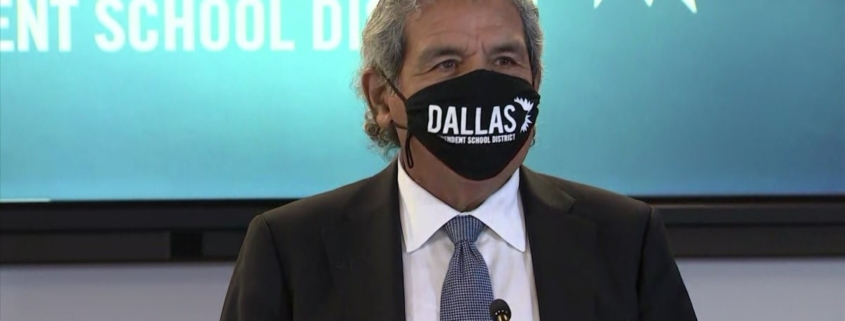Dallas ISD Makes Masks Mandatory as Students Return to Classrooms – NBC 5 Dallas-Fort Worth
What to Know
- Dallas ISD is temporarily requiring all staff, students and visitors to wear masks when on district property.
- Superintendent Michael Hinojosa says the measure will help protect staff and students from the spread of the highly contagious Delta variant of the coronavirus.
- Hinojosa told NBC 5 last week that he was looking into whether or not Dallas can have virtual as an option later this year.
The Dallas Independent School District will require face masks on district property beginning Tuesday, a move the district says is necessary to help prevent the spread of the highly contagious delta variant of the coronavirus.
Superintendent Michael Hinojosa made the announcement during a Monday morning news conference, defying an executive order from Texas Gov. Greg Abbott (R) that prohibits districts from mandating face masks.
“Governor Abbott’s order does not limit the district’s rights as an employer and educational institution to establish reasonable and necessary safety rules for its staff and students,” a district statement read. “Dallas ISD remains committed to the safety of our students and staff.”
The Dallas Independent School District will require face masks on district property beginning Tuesday, a move the district says is necessary to help prevent the spread of the highly contagious delta variant of the coronavirus.
Hinojosa, who leads the largest school district in North Texas and second-largest in the state, referenced the recent UT Southwestern COVID-19 forecast which predicts a worrying spike in virus-related hospitalizations by the end of this month if behaviors aren’t changed.
According to the study, should behavior in Dallas and Tarrant counties continue in the current unmitigated, pre-pandemic patterns, with no masking and no social distancing, the number of occupied hospital beds in Dallas County is predicted to reach 1,500 by Aug. 23 and could reach 4,000 by October.
Parents both in and outside of Dallas ISD reacted to the news — many positively.
“My son is behind in school he’s been virtual since March 2020 and he has to go back,” said Brittany Liles, a Frisco ISD parent who chose in-person learning, despite what…
